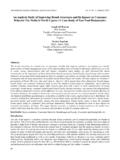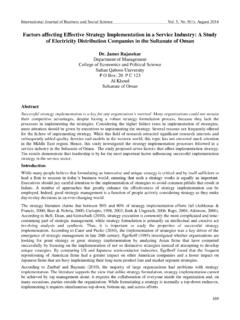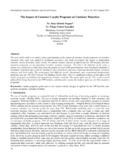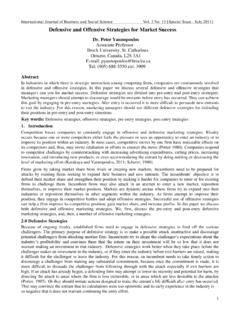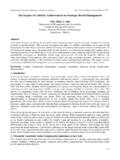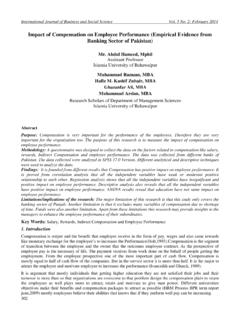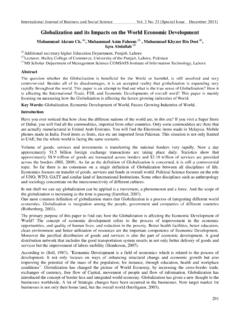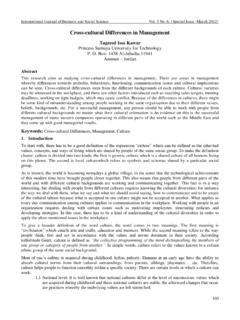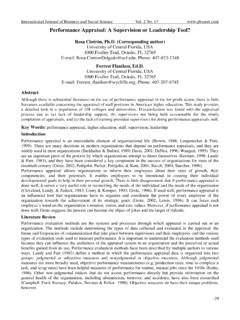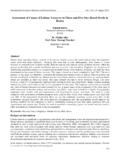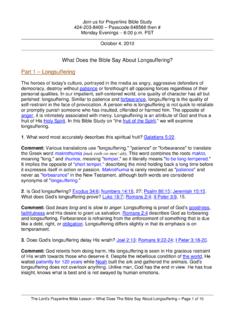Transcription of Impact of Ethical Leadership on Employee Job Performance
1 International Journal of Business and Social Science Vol. 3 No. 11; June 2012. Impact of Ethical Leadership on Employee Job Performance Shukurat Moronke Bello Lecturer Department of Business Administration and Entrepreneurship Bayero University Kano, Nigeria 3011, Kano, Nigeria Abstract Despite the growing concern of researchers in the field of business ethics, cases of unethical practices have continue to manifest in corporate organisations. Corporate leaders engage in decisions that have resulted to lack of trust in the organisations Leadership ; and lack of commitment to organisation's goals. This paper tries to examine the concept of Ethical Leadership , the characteristics of an Ethical leader, Ethical Leadership and its Impact on Employee job Performance and how organisations can develop leaders that are not only sound in character but sound in action.
2 Corporate business leaders are expected to be persons of strong characters and serve as role models to their employees; which without, the organisation's goals may be undermined. Two important variables; trust and commitment were discussed for better understanding of Ethical Leadership and Employee job Performance . The study concludes with some suggestions from the literature. Key Words: Ethical Leadership , Employee , Job Performance , Trust, Commitment. 1. Introduction Ethical Leadership is a clarion call to the recent credit crisis, the worst global recession since the 1930s; and the various scandals in former leading corporate business organisations. The Enron, Arthur Andersen, WorldCom, Tyco, Parmalat and HealthSouth are among many businesses in the developed countries where leaders failed ethically for a variety of reasons, which may include pressures to achieve, perform and to "win at all costs".
3 Top executives of corporate organisations contribute to the recent credit crisis by making fraudulent decisions that artificially inflate profits to increase compensation (Berenbeim, 2009; O Connell & Bligh, 2009; Victor & Soutar, 2005). In a survey conducted in 2010 among and some continental Europe companies; it was revealed that the most significant Ethical issues to organisations are bribery, corruption and facilitation payments; whistle blowing/speaking up and discrimination, harassment or bullying (Webley, Basran, Hayward & Harris, 2011). For instance, Texaco in 1996 made $176 million settlement for racial discrimination; Mitsubishi Motor Corporation settled $34 million in 1998 after a government investigation of pervasive sexual harassment and Louisana.
4 Pacific Corporation paid a fine of $37 million in 1998 for customer and environmental fraud among other unethical practices. Apart from cases of unethical practices in developed nations, evident have also shown in developing countries. For instance, Nigeria, one of the developing countries in the sub-Sahara Africa has witnessed increased in the rate of corporate failures. There were reported cases of corporate failure in Nigeria which were attributed to unethical practices of corporate leaders. The Nigerian banking sub-sector was at the halt of collapse in 1997, twenty-six commercial banks failed due to financial irregularities. In 2006, Cadbury Nigeria Plc, one of the leading Food and Beverages firms in Nigeria was affected by financial scandal.
5 Cadbury Nigeria plc financial statement and accounts was falsified at the detriment of all stakeholders. Also in August 2011, three Nigerian banks namely, Afribank Plc, Spring Bank Plc and Bank PHB failed due to financial irregularities of their corporate managers. These banks were among the eight banks placed under Central Bank of Nigeria (CBN) management in August 2009 following the clean-up of the banking industry. Ethical behaviour includes key principles such as honesty, integrity, fairness, and concern for others. This is a situation where by leaders engage in behaviour that benefits others and refrains from behaviour that can cause harm to others (Toor & Ofori, 2009). Often, corporate leaders see their work as separate from their lives.
6 228. Centre for Promoting Ideas, USA Ethics must indeed begin at the top. Leaders cannot shrink from their obligations to set a moral example for their followers; formal Ethical codes and ethic training have little chance of success unless the Ethical actions and behaviour of top management are consistent with what they teach. Leaders are the key to determine the outcome of organisational goals and to set the tone for Employee behaviour which may include promotion, appraisal and strategies (Brown & Mitchell, 2010). Organisational leaders should encourage employees by leading by examples; they have the responsibility to define organizational norms and values, live up to expectations and encourage their followers to adopt same.
7 Negative examples of immoral behaviour by corporate executives are like a cancer on Ethical behaviour within organisations (Fisher & Lovell, 2003). If leaders are perceived to be ruthless and inconsiderate in their business dealings with others, employees are likely to get the message too (Crane & Matten, 2004). Employees want to be associated with managers that are honest, credible, respectful, and fair (Kouzes & Posner, 2007 cited in Collins, 2010). Organisations can achieve better Employee attraction and retention when employees have the opportunity to work for truly responsible and Ethical employers (Bower, 2003 cited in Upadhyay & Singh, 2010; Collins, 2011). Failing to be a good leader can lead to increase Employee turnover and decrease the likelihood of attracting new employees.
8 This can also increases the costs associated with Employee turnover, increase Employee supervision, decreases job satisfaction and decrease the level of Employee productivity. Indeed, corporate organisations are characterized by bribery, corruption, facilitation payments and discrimination issues among others. These forms of unethical practices if not manage appropriately will likely have spillover effect on the Performance of employees. It is therefore, an urgent attention to manage Ethical issues worldwide. This paper examined the concept of Ethical Leadership ; the characteristics of an Ethical leader; the roles Ethical leaders in improving Employee job Performance ; the development of Ethical leaders, and finally, conclusion and recommendations.
9 The Concept of Ethical Leadership Leadership is defined as a process whereby an individual influences a group of individuals to achieve a common goal (Northouse, 2007). Theoretically, there are three basic ways to explain how people become leaders: the trait Leadership theory, the great event theory and the process Leadership theory (Bass, 1990). Trait theory is a situation where some personality traits may lead people naturally into Leadership roles. A crisis or important event may cause a person to rise to the occasion, which brings out extraordinary Leadership qualities in an ordinary person;. this is the Great Events Theory. The process theory is a situation when Leadership skills are learnt. According to Burns (1978), the Leadership process occurs in one of two ways, either transformational or transactional.
10 Transformational Leadership is concerned with developing a vision that informs and expresses the organization s mission and lays the foundation for the organization s strategies, policies and procedures. The transformation leader uses strategies and techniques to empower the followers, enhance their self-efficacy and change their values, norms, and attitudes, which are consistent with the leader s vision. Transformational Leadership style seeks to improve the condition of the followers in order to effectively and efficiently achieve the goals of the organization. The transformational leader uses four forms of behavior;. inspirational motivation, individualized consideration, idealized influence and intellectual stimulation.
